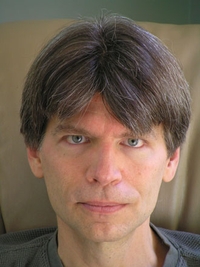About halfway into Powers’s follow-up to his National Book Award–winning The Echo Maker
, a Nobel Prize-winning author, during a panel discussion, talks about how “genetic enhancement represents the end of human nature.... A story with no end or impediment is no story at all.” This then, is a story with both. Its hero, at least initially, is Russell Stone, a failed author of creative nonfiction turned reluctant writing instructor who cannot help transmitting to his students something of his flagging faith in writing. One of them, a Berber Algerian named Thassadit Amzwar, is so possessed by preternatural happiness that she’s nicknamed “Miss Generosity” by her prematurely jaded classmates and has emerged from the Algerian civil war that claimed the lives of her parents “glowing like a blissed out mystic.” After Stone learns that Thassadit may possess a rare euphoric trait called hyperthymia, her condition is upgraded from behavioral to genetic, and Powers’s novel makes a dramatic shift when Thassadit falls into the hands of Thomas Kurton, the charismatic entrepreneur behind genetics lab Truecyte, whose plan to develop a programmable genome to “regulate the brain’s set point for well-being” may rest in Miss Generosity’s perpetually upbeat alleles. Much of the tension behind Powers’s idea-driven novels stems from the delicate balance between plot and concept, and he wisely adopts a voice that is—sometimes painfully—aware of the occasional strain (“I’m caught... starving to death between allegory and realism, fact and fable, creative
and nonfiction”). Like Stone and Kurton, Powers strays from mere record to attempt an impossible task: to make the world right. (Oct.)



